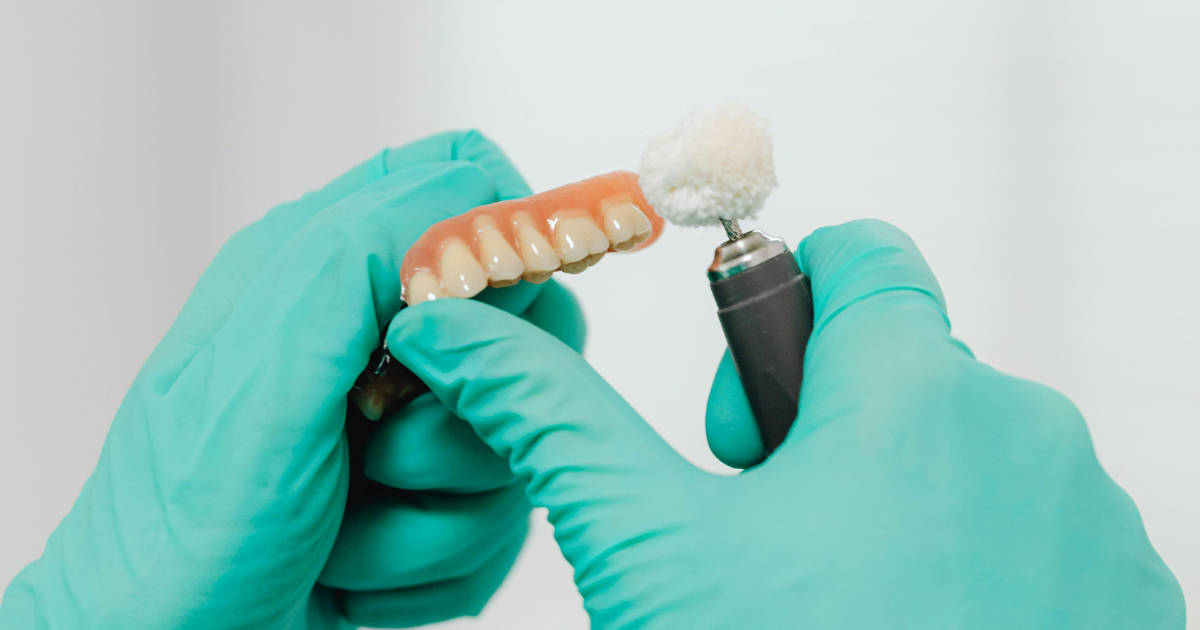A quick guide to metal dentures
A metal plate and clasps are designed to be bespoke to your mouth — securing to your natural teeth to provide comfort and a precise fit. By blending the false teeth with your real teeth, your metal dentures can help completely restore your smile.
They’re typically worn by patients with several remaining natural teeth and provide secure, sturdy, long-term replacement teeth.
Reading time: 4 minutes

A metal plate and clasps are designed to be bespoke to your mouth — securing to your natural teeth to provide comfort and a precise fit. By blending the false teeth with your real teeth, your metal dentures can help completely restore your smile.
What are metal dentures?
Metal dentures refer to the metal clasps used to hold dentures in place. Dentures with metal use pink acrylic gums and teeth — much the same as other partial dentures — to replace your missing teeth. The main benefit is that metal partial dentures are known for their durability.
Each set is hypoallergenic and made for the denture wearer, using a metal framework to secure them to the natural teeth. This framework usually contains cobalt chrome, making it light to wear.
What are metal dentures made of?
In the UK, metal dentures are generally custom-made to fit the individual patient's mouth, ensuring a comfortable and secure fit. The metal framework provides the necessary support for the artificial teeth and helps maintain the structure and function of the denture over time.
Metal dentures are commonly made from the following materials:
- Cobalt-chromium alloy: This is the predominant material used for metal dentures in the UK. The alloy offers excellent strength, lightness, and corrosion resistance, making it a popular choice for denture frameworks. Its biocompatibility ensures it is safe for use in the mouth, and it provides a durable, long-lasting solution.
- Titanium: Titanium is also used in the UK for denture frameworks, though it is less common than cobalt-chromium due to higher costs. Titanium is favoured for its exceptional biocompatibility, lightweight, and strength. It's particularly used in cases where patients may have allergies to other metals or require a lighter denture.
- Gold alloys: While not as common due to the expense, gold alloys are sometimes used for specific dental applications. Gold's properties of biocompatibility, malleability, and corrosion resistance make it a viable option, though it's typically reserved for specific elements rather than entire frameworks.
- Nickel-chromium alloy: The use of nickel-chromium alloys has decreased in the UK due to the potential for allergic reactions to nickel. However, in some cases, it might still be used for cost-effective solutions where patient allergies are not a concern.
These frameworks are often combined with acrylic or other materials to enhance comfort and aesthetics, ensuring a natural look and feel for the patient.
Advantages of metal denture base
Partial dentures can vastly improve your quality of life. They help you chew and speak, and feel the same way as natural teeth.
Metal dentures, specifically, offer several unique benefits, including:
- They do not cover the roof of the mouth, allowing for increased comfort.
- Metal dentures are sturdier than other solutions like plastic dentures, providing long-term tooth replacement and increasing wearer confidence.
- Metal clasps provide a precise fit, improving retention, comfort and aesthetics.
- The metal base can be removed and washed, improving oral hygiene and preventing build-up within the false teeth.
Disadvantages of metal dentures
While there are many advantages to metal dentures, there are also some potential disadvantages:
- Metal parts can be more expensive than plastic parts.
- While metal clasps provide a secure, sturdy fit, they can be tricky to alter.
- If you have gum disease, improper fit may make the condition worse.
- Some may find that metal dentures take a little while to get used to.
While it’s important to consider these factors, many wearers find that the benefits outweigh the limitations. Some patients may want to consider dental implants or bridges if the disadvantages outweigh the benefits and they deem full dentures to be unsuitable for their needs and lifestyle.

How much do metal dentures cost in the UK?
The cost of partial dentures depends on several factors. Metal dentures, in particular, can be more expensive than other solutions. They can cost anywhere up to £1,500, depending on the materials used, dental clinic location, number of teeth to be replaced, and the complexity involved.
How do I get metal partial dentures?
You can get metal partial dentures by speaking with a qualified dentistry professional. In general, anybody with missing teeth can be a suitable candidate — although some patients may require dental care before the dentures can be created.
What metal are partial dentures made of?
Partial dentures, particularly in the UK market, are primarily made from metal frameworks that provide strength and durability while being comfortable for the wearer. The most common metals used include cobalt-chromium alloy, the most widely used partial dentures material, titanium and nickel-chromium alloy.
Acrylic partial dentures
Acrylic partial dentures, also known as "flippers" or "temporary partials," are removable dental appliances used to replace one or more missing teeth. Unlike metal-based partial dentures, acrylic partial dentures are primarily made from acrylic resin, a type of plastic.
How long does it take to get used to metal dentures?
Once you have your new dentures, getting used to them can take some time. Some people might get accustomed within days — others might take a few weeks or even months.
The important thing to remember is that everybody eventually gets used to their metal dentures.
Even if they initially feel strange, they’ll soon feel completely natural. If you have any doubts, make sure to reach out to your dental practice who can help advise on tips to make the experience more comfortable.